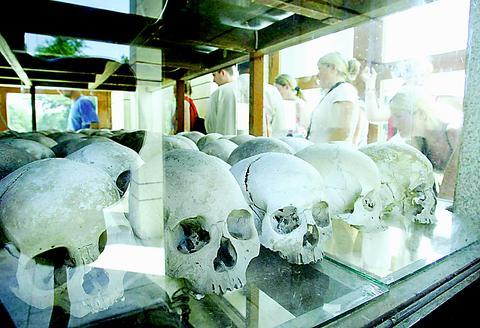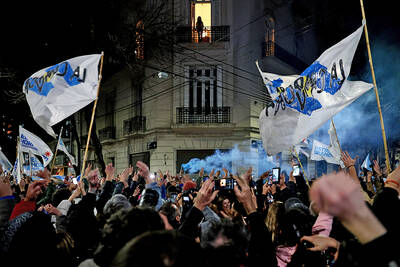The Khmer Rouge followed a harsh brand of communism, killing nearly two million people in their bid to return Cambodia to Year Zero. Now they have a new faith: evangelical Christianity.
Hundreds of former fighters have been baptized in the past year. The Khmer Rouge's mountain stronghold, the town of Pailin in southwest Cambodia, has four churches, all with pastors and growing congregations. At least 2,000 of those who followed Pol Pot, the guerrillas' former leader who died six years ago, now worship Jesus. Many new converts were involved in the bloody battles, massacres and forced labor programs that led to the Killing Fields. Between 1975 and 1979 the Khmer Rouge sought to eradicate religion, ripping down the country's biggest cathedral, killing Muslim clerics and turning Buddhist temples into pigsties. According to one pastor, 70 percent of the converts in Pailin are Khmer Rouge. For many, it offers a hope of salvation.

PHOTO: AFP
"When I was a soldier I did bad things. I don't know how many we killed. We were following orders and thought it was the right thing to do," said Thao Tanh, 52. "I read the Bible and I know it will free me from the weight of the sins I have committed."
The Khmer Rouge have been the focus of a drive by US-based religious groups. Lee Samith, a senior aide of Pailin's governor, was a military intelligence officer for the Khmer Rouge and one of the cadres to convert. He had been repeatedly visited by a missionary from a Colorado-based group, who showed films of the life of Christ.
"I opened my heart and Jesus came in," said Lee, 36. Like 90 percent of Cambodians, he was previously a Buddhist. Now he is involved in the New Life Presbyterian Church, on the outskirts of Pailin. Its wooden walls are covered with Christmas decorations and colorful posters portraying the life of Jesus.
But Lee has yet to shed all his former ideology. "Pol Pot had good ideas for Cambodia and for all people," he said. "Only foreigners talk about genocide. Deaths due to class conflict are inevitable."
After being ousted from Phnom Penh, the Cambodian capital, in 1979 by the Vietnamese, the Khmer Rouge withdrew to the mountains to fight a series of regimes.
But the Khmer Rouge has now largely been brought in from the cold. Pailin's governor is a member of the Cambodian Prime Minister's party, despite being a former bodyguard of Pol Pot. His deputy, Kuoet Sothea, a key aide of the genocidal leader, said that many of his former comrades-in-arms "feel sorry for what they did."
Several senior figures, such as "Duch" -- Kang Kek Ieu -- who ran the S21 complex in Phnom Penh where an estimated 16,000 people died, have converted to Christianity. Their new faith offers more than spiritual comfort. After years of negotiation with the UN, the Cambodian government has reluctantly agreed to put those responsible for the genocide of the late 1970s on trial. Several Khmer Rouge leaders live in villas in Pailin, profiting from large farms, logging of hardwood forests and gem mining. Though many are old, they now fear dying in prison. Christian repentance is likely to mitigate any sentence they might receive.
Kun Lung, 49, started as a bodyguard for the senior commanders and became the Khmer Rouge's best-known propagandist, responsible for bloodcurdling broadcasts on their infamous radio station. He was baptized recently and now organizes Pailin Radio, describing "God's work."

LANDMARK CASE: ‘Every night we were dragged to US soldiers and sexually abused. Every week we were forced to undergo venereal disease tests,’ a victim said More than 100 South Korean women who were forced to work as prostitutes for US soldiers stationed in the country have filed a landmark lawsuit accusing Washington of abuse, their lawyers said yesterday. Historians and activists say tens of thousands of South Korean women worked for state-sanctioned brothels from the 1950s to 1980s, serving US troops stationed in country to protect the South from North Korea. In 2022, South Korea’s top court ruled that the government had illegally “established, managed and operated” such brothels for the US military, ordering it to pay about 120 plaintiffs compensation. Last week, 117 victims

China on Monday announced its first ever sanctions against an individual Japanese lawmaker, targeting China-born Hei Seki for “spreading fallacies” on issues such as Taiwan, Hong Kong and disputed islands, prompting a protest from Tokyo. Beijing has an ongoing spat with Tokyo over islands in the East China Sea claimed by both countries, and considers foreign criticism on sensitive political topics to be acts of interference. Seki, a naturalised Japanese citizen, “spread false information, colluded with Japanese anti-China forces, and wantonly attacked and smeared China”, foreign ministry spokesman Lin Jian told reporters on Monday. “For his own selfish interests, (Seki)

Argentine President Javier Milei on Sunday vowed to “accelerate” his libertarian reforms after a crushing defeat in Buenos Aires provincial elections. The 54-year-old economist has slashed public spending, dismissed tens of thousands of public employees and led a major deregulation drive since taking office in December 2023. He acknowledged his party’s “clear defeat” by the center-left Peronist movement in the elections to the legislature of Buenos Aires province, the country’s economic powerhouse. A deflated-sounding Milei admitted to unspecified “mistakes” which he vowed to “correct,” but said he would not be swayed “one millimeter” from his reform agenda. “We will deepen and accelerate it,” he

Japan yesterday heralded the coming-of-age of Japanese Prince Hisahito with an elaborate ceremony at the Imperial Palace, where a succession crisis is brewing. The nephew of Japanese Emperor Naruhito, Hisahito received a black silk-and-lacquer crown at the ceremony, which marks the beginning of his royal adult life. “Thank you very much for bestowing the crown today at the coming-of-age ceremony,” Hisahito said. “I will fulfill my duties, being aware of my responsibilities as an adult member of the imperial family.” Although the emperor has a daughter — Princess Aiko — the 23-year-old has been sidelined by the royal family’s male-only